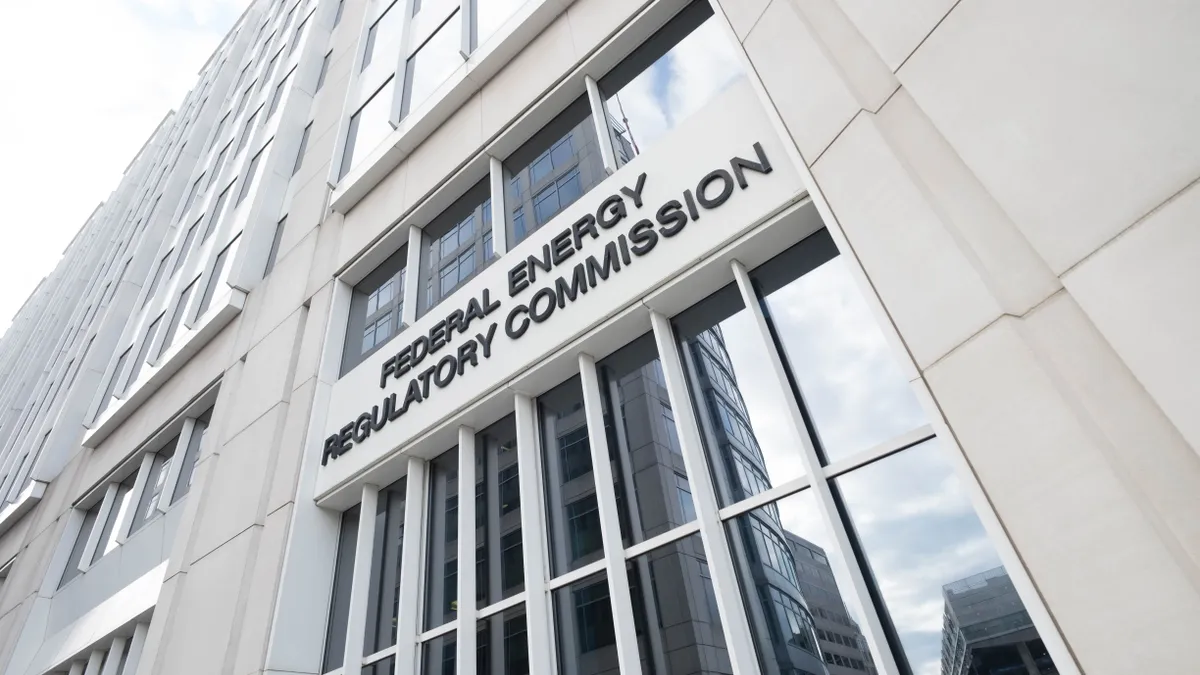Dive Brief:
- The Federal Energy Regulatory Commission on Thursday determined that demand response can be aggregated with other distributed energy resources (DERs) under regulators' Order 2222, intended to lower market barriers for DER aggregations.
- FERC's order accomplishes this by choosing not to allow an opt-out provision that would enable grid operators to refuse aggregated demand response offers where participation is not allowed by state regulators. "This was necessary to realize the full promise of Order 2222," said Commissioner Neil Chatterjee during FERC's open meeting.
- But Commissioner Mark Christie, who served as a Virginia utility regulator before joining FERC, in his dissent decried the move as a violation of state's rights, and argued that it could have a negative impact on local municipal and public power providers, and unnecessarily raise ratepayer costs.
Dive Insight:
FERC's Thursday order gives some clarity as to what DER aggregations might look like under its landmark 2222 order, part of a broader push by the commission to lower market barriers for new technology entrants.
Clean energy interests had asked the commission not to extend states the opt-out option for demand response, and the majority of commissioners agreed that to allow states to prohibit demand response from participating would "undermine the goals" of 2222. Further, the majority argued, FERC's jurisdiction on wholesale market issues is clear.
"The Commission's authority squarely allows it to regulate wholesale market access — in fact it requires it to regulate wholesale market access," said Commissioner Allison Clements.
But Christie, in his dissent, criticized the commission for being too overbearing and not respecting the ability of states to set their own market rules.
"If I was going to describe this order in one word I think I would use the Greek word 'hubris,'" he said during the open meeting. "It's based on the belief that the members of this commission know better how to manage the complicated issues of timing, grid reliability and the costs of behind-the-meter DER deployment than all the state regulators in all 50 states" and than all the "dedicated people" who run municipal and public power authorities, and electric cooperatives.
"And it's based on the false belief that state regulators, public power authorities, municipal power authorities and co-ops are opposed to behind the meter DER deployment, so these people cannot be trusted to manage … DER deployment. And I know that's just not true."
He argued that those are the very people who have been engaged and are leading the way on DER deployment. He fears the order will empower investor-owned utilities to put "billions of dollars" into their rate base in a facade of complying with FERC's ruling.
"As a former state regulator who sat in on a lot of rate cases, I've heard this argument before. And it's very hard, frankly is almost impossible, for a state regulator to deny cost recovery when the utility says we have to spend this money to comply with federal regulations," he said. "That's a very hard argument to rebut." As a result, costs of this order will be "substantial," he said.
FERC Chair Richard Glick was a vocal advocate for state rights in previous commission orders where he felt federal regulators were attempting to block state resource decisions. He said he resonated with Christie's arguments, and would be interested in discussing them further, but also believes his stance on this order is not inconsistent with his previous statements on state rights.
Orders like the minimum offer price rule (MOPR) expansion are a clear violation of the Federal Power Act, Glick said, while courts have previously upheld the commission's jurisdiction over the wholesale market issues raised in Order 2222, as was affirmed by the U.S. Court of Appeals for the D.C. Circuit in their ruling on a similar order lowering barriers to energy storage in wholesale markets.
"There's no dispute over this — under the federal power act, the states have authority over resource decision-making, not FERC, not the federal government," he told reporters after the meeting. "Whereas in this particular case, the courts have ruled that we have jurisdiction over … participation in the wholesale market. And so I don't think it's a contradiction, to be as concerned as I am on the MOPR side and to support order 2222."














